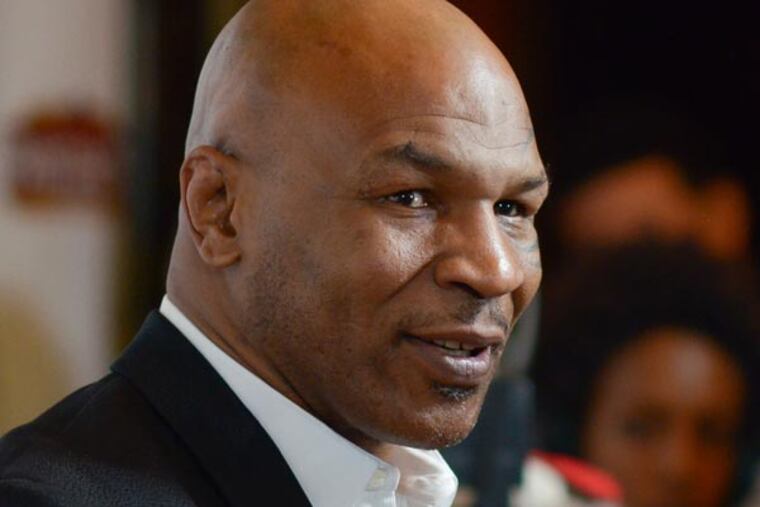Tyson delivers riveting one-man show about his life
Notorious boxer Miker Tyson spares audience nothing as he talks of his rise, fall and renewal.

MIKE TYSON says Don King charged him $8,000 a month for towels. For towels! And then he looks to the balcony and he deepens his voice and he shouts again, in case they did not hear him the first time, "Eight thousand a month for towels."
You remember Tyson. Brownsville thug to youngest heavyweight champion in the whole cockeyed history of the sport. Married Robin Givens. Squandered $400 million. (Maybe that should be one sentence, not two.)
Did 3 years in the joint, convicted of raping a beauty-pageant contestant. Says he was not guilty. Says the fact that he served only 3 years, much of it shackled in solitary confinement, proves he didn't do it.
Snorted cocaine. How often, someone once asked him. "Every time I could get my hands on some," he answered swiftly, truthfully.
Tyson stormed through town the other night, performing the one-man show he calls "Undisputed Truth" at the Academy of Music. Set an Academy of Music record for f-bombs. If his f-bombs were confetti, three guys with long-handled bristle brooms would still be sweeping up.
It was a fascinating performance, crude and shrewd, funny and sad. The capacity audience loved it, because it provided that rare chance to eavesdrop on someone infamous spilling his guts without a fat leather psychiatrist's couch anywhere in sight.
He strutted across that stage. He danced. He shadow-boxed. He did other voices. He was an entertainer, a survivor, proud of being clean and sober for 3 years, married with kids, thoroughly "domesticated."
His wife Kiki, pretty and smart, wrote the show. Spike Lee shaped it. But Tyson brings his own passion, his own pain, his own pride to the stage.
When the curtain goes up, Nat King Cole is singing "Nature Boy" in the background, the ballad about that "strange, enchanted boy." There was nothing enchanted or enchanting about Tyson's boyhood in Brownsville. One name listed as his father on his birth certificate, another name gossiped in the 'hood.
"I didn't know who my father was," Tyson moans in the show. "Is it any wonder I'm so bleeped-up?"
In New York, he played the Longacre Theatre. He recalled once getting arrested for robbery a block away, and how he thanks the New York cop who collared him, because that put him in reform school, where he met Bobby Stewart, who ran the boxing program, who touted him to Cus D'Amato, who taught him to conquer the stifling fear he felt inside and fulfilled the promise to make him the youngest heavyweight champion in the cockeyed history of the sport.
D'Amato died in 1985. Tyson calls the people who squandered his money and enabled his vices "parasites." He lumps King, the flamboyant promoter, in that category, mocking King's "Only in America" mantra.
He gets sour revenge against Givens and her mother. He bends the truth, blaming his rape conviction on shabby defense by "a tax attorney."
He had qualified lawyers, but it was strange that they chose a weird line of defense, saying the young woman should have known better than to go to Mike's hotel room because the world knew that Tyson was a brutal, primitive savage.
He follows that vengeful rant with a sweet segment about being visited in jail by Florence Henderson and another member of the "Brady Bunch" cast.
He describes in excruciating detail his 1988 Harlem street brawl with Mitch Green, and maybe it rambles on 4 minutes too long, but dammit, he kept knocking Green down and Green kept getting up, perhaps fueled by angel dust or stubbornness or stupidity.
And then, near the end, he talks about the anguish he felt when his daughter Exodus died in a tragic accident in 2009, a cord from a treadmill around her throat. She was 4.
I have known Tyson since he was a teenager, Olympic trials, Fort Worth, Texas, manipulated out of his chance to represent the country as the 1984 heavyweight. I have seen him in moments of triumph and tragedy. I was there when he knocked out Carl "The Truth" Williams in 93 seconds, when the anthem that night had lasted longer. Much longer.
He seemed headed for a painful ending. In the show, he talks about the prophecy of the only way out of Brownsville, "handcuffed or in a plain wooden box."
He was morbidly obese, then lost 160 pounds after meeting Kiki. He shed all that weight, he dumped so much pent-up anger. "Meeting my wife, best thing that ever happened to me," he said afterward, sweaty and exultant. He was gracious, especially kind to Gene Kilroy, who worked with Muhammad Ali in those glory years.
Was there an epiphany, a life-changing moment when he knew he could not go on boozing and drugging and womanizing?
"When my daughter died," he said softly. "I felt guilty, that I was a negligent father. I wanted to change my life, be a better person."
And then he quoted Mark Twain. Mark Twain! "Twain said we are all animals," Tyson whispered. "He said we have to learn to be human. We have to learn to love one another and be loved in return."